Hanoi National Children's Hospital received many children with hand, foot and mouth disease with complications of encephalitis, showing symptoms of startle, tremors in hands and feet, and unsteady walking.
On June 22, MSc. Dr. Do Thi Thuy Nga, Deputy Head of Internal Medicine Department, Tropical Disease Center, said that there are two common complications of hand, foot and mouth disease: neurological and respiratory and circulatory failure. However, recently, this unit has received more children with neurological complications, typically encephalitis.
"The children were admitted to the hospital in a conscious state, without much disturbance of perception, but showed signs of being startled, especially at the beginning and end of sleep. In addition, they had tremors in their limbs and walked unsteadily," said Ms. Nga.
Like the case of a 26-month-old girl in Bac Giang , who was hospitalized with a high fever that did not go down, many red rashes, and frequent startles, she was diagnosed with hand, foot, and mouth disease, with complications of encephalitis.
The mother said that at the beginning of the year, the child had contracted hand, foot and mouth disease with symptoms of fever and mouth ulcers, but was cured after a few days of treatment at home. This time, when the child contracted the disease again, the family did not think the child was seriously ill, so they delayed taking the child to the hospital. Fortunately, the child was treated promptly, is now conscious and ready to go home.
Another case, a one-year-old male in Vinh Phuc , had a high fever, was fussy, drooled, and ate poorly, but his parents thought he had a fever due to teething so they did not take him to the doctor. When the child was startled and vomited a lot, the family took him to the National Children's Hospital, where he was diagnosed with hand, foot, and mouth disease EV71, with complications of encephalitis.
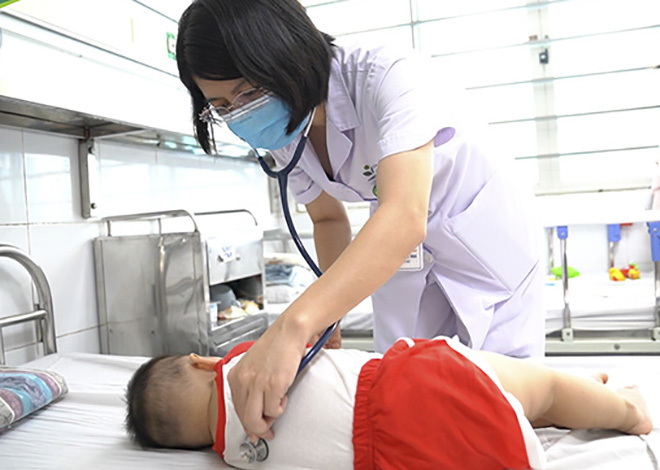
A child with hand, foot and mouth disease is being cared for at the National Children's Hospital. Photo: Truong Giang
In the past 5 years since the 2018 epidemic, severe cases of hand, foot and mouth disease have been rare. This year, the appearance of the Enterovirus 71 (EV71) strain, which has the characteristics of spreading quickly and being highly virulent, has led to an increase in severe cases. Since the beginning of the year, the National Children's Hospital has received more than 1,200 cases, nearly 500 children have had to be hospitalized for treatment, 30% of whom are infected with EV71. In Ho Chi Minh City, the number of cases has also increased rapidly, nearly 150% in the past month, many of which are severe.
Dr. Nguyen Van Lam, Director of the Center for Tropical Diseases, said that the two common groups of agents causing hand, foot and mouth disease are Coxsackie virus A16 (CA16) and Enterovirus 71 (EV71). While children infected with CA16 often have mild symptoms and can be cared for and treated at home, EV71 will cause more severe illness with many dangerous complications such as encephalitis, meningitis, myocarditis, pneumonia, respiratory and circulatory failure, and can be fatal if not treated promptly.
Therefore, Dr. Lam recommends that parents need to recognize the signs of the disease early. Children start with symptoms of fever, poor appetite, discomfort and sore throat. One to two days after the fever, sores appear in the mouth causing pain. Initially, they are red blisters and often develop into ulcers, mainly on the tongue, gums and inside the cheeks.
The disease is considered severe when there are symptoms of continuous high fever that does not respond to medication; fatigue, not playing, not eating, sleeping a lot, lethargy; being startled more than 2 times in 30 minutes. Sweating, cold all over the body or in the hands and feet. Rapid breathing, abnormal breathing such as apnea, shallow breathing, chest retraction, wheezing. Trembling of limbs, body, unsteady sitting, staggering.
The disease progresses rapidly and unpredictably, so when a child is found to be ill, the family should take the child to a medical facility for advice on care, to detect severe symptoms, and to promptly treat them. Parents should not self-medicate, as this can make the child's illness worse.
Le Nga
Source link



![[Photo] President of the Cuban National Assembly visits President Ho Chi Minh's Mausoleum](https://vphoto.vietnam.vn/thumb/1200x675/vietnam/resource/IMAGE/2025/10/1/39f1142310fc4dae9e3de4fcc9ac2ed0)


![[Photo] Hanoi morning of October 1: Prolonged flooding, people wade to work](https://vphoto.vietnam.vn/thumb/1200x675/vietnam/resource/IMAGE/2025/10/1/189be28938e3493fa26b2938efa2059e)

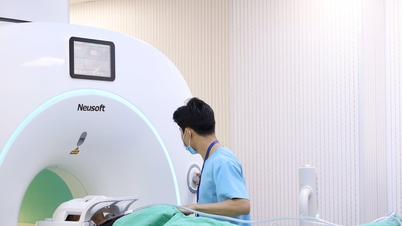









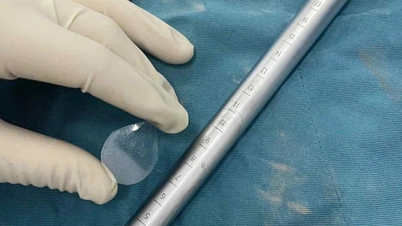



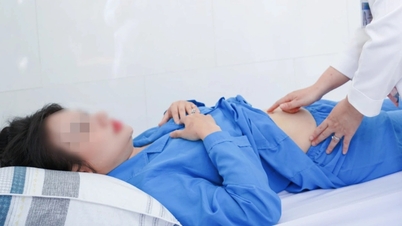


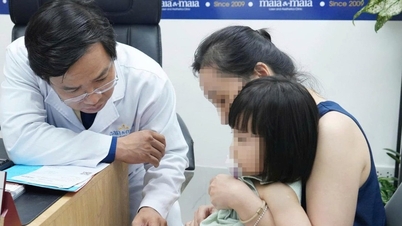








































































Comment (0)